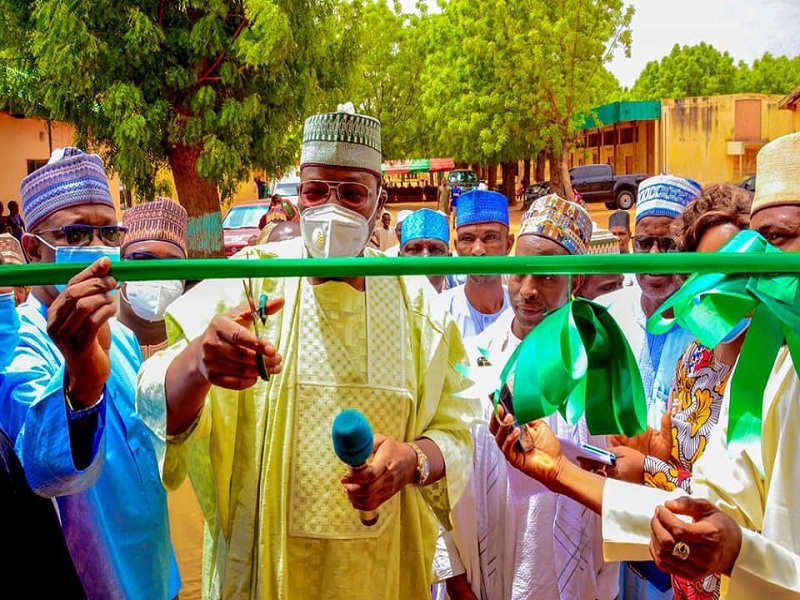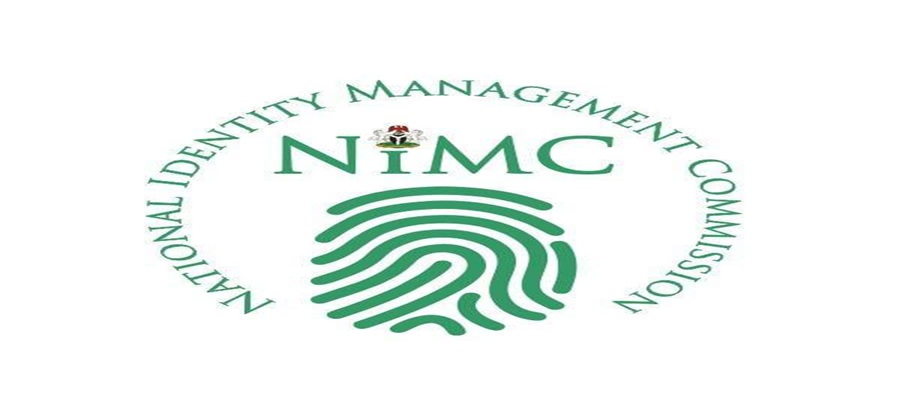Telecom
Danbatta Seeks Stakeholders’ Support for Ubiquitous ICT Adoption

Prof. Umar Garba Danbatta, executive vice chairman (EVC), Nigerian Communications Commission (NCC), has urged stakeholders in Nigeria to support the Commission in its noble quest to ensure ubiquitous adoption and use of Information and Communications Technology (ICT), with a view to transforming the nation’s economy.

This is just as the EVC pledged the commitment of NCC to continue to be in the vanguard of implementing the Federal Government’s policies aimed at digitalising the nation’s economy.
Danbatta made the call at the weekend while commissioning “Prof Umar Garba Danbatta Computer Laboratory” donated by Huawei Technologies Company Nigeria Limited to the Government Senior Secondary School (GSS), Danbatta, Kano State.
The historic school is the alma mater of Prof. Danbatta, who, himself, has consistently implemented many philanthropic and people-oriented projects in his Danbatta community in addition his strides in driving the development of ICT adoption and usage, via numerous initiatives as the country’s Chief Telecoms Regulator.
Danbatta, who expressed his gratitude to the company for choosing his alma mater for the important ICT project, however, noted that the facility will not only bring invaluable benefits to the students and teachers of the GSS in Danbatta, but it will also impact the other neighbouring schools, which can utilise the tech facility for preparing their pupils for the Joint Admission and Matriculation Board (JAMB) and other educational purposes.
He charged the students and others desirous of acquiring for upgrading their knowledge of ICT to avail themselves of the ample opportunity provided by the new facility within their own domain.
Restating the NCC’s commitment toward digitalization of Nigeria’s economy, Prof Danbatta, said that the Commission will continue to be in the forefront in the implementation of the Federal Government’s policies aimed at achieving the goal.
Speaking earlier, Mrs. Lola Fafore, Director Public Relation of Huawei Nigeria, observed that the fully-fledged computer laboratory donated to the school is equipped with free 4G internet service for 90 days as well as computer-based testing (CBT) training applications for JAMB installed in the computers for the benefit of the students.
She said, as part of the company’s contribution to Nigeria through corporate social responsibility, the firm would continue to promote digital inclusion, especially through provision of access to technology.
“As a company, Huawei looks forward to making more contributions to Nigeria by supporting the NCC in bridging the digital connectivity divide, training talents, building capacity, knowledge transfer and supporting the process of achieving a fully-digital economy,” she said.
Also speaking at the occasion, the Chairman of Danbatta Charity Foundation (DCF), Alhaji Nasiru Danguda, commended the NCC for attracting major development projects to the community, thereby opening unprecedented windows of opportunity for the people.
Danguda said, “This is not the first time Huawei is donating this kind of project in Danbatta as Maimunatu Girls Secondary School is also a previous beneficiary. We, the people of Danbatta, are grateful to you and are also proud that we have Prof Danbatta making us proud with his outstanding performance at NCC, which has attracted us to global giants like Huawei.”
Only recently, traditional rulers and concerned community leaders commended Prof. Umar Garba Danbatta for his role in boosting security and supporting other initiatives aimed at stepping up the tempo of development in Danbatta Local Government Area, Kano State and its environs vis-a-vis concerted effort towards national development.
The inauguration ceremony was organised by DCF in conjunction with four other organisations, namely Zauren Tuntuba, a non-for-profit organisation; Danbatta Academic Forum (DAF); Danbatta Reporters; and, Duniya Ba Hutu.
Also at the event, 10 (ten) female students from Muslim Community College of Health Sciences and Technology, Funtua, and another 20 (twenty) female beneficiaries of the vocational training empowerment programme with bias for tailoring and fashion designing, all under the sponsorship of Prof. Danbatta, celebrated their graduation.
The event, which featured the presentation of sewing machines and other fashion designing items to the two sets of qualified trainees, also saw Prof. Danbatta being conferred with a special recognition award for his immense contribution to the security of Danbatta community, among other community development initiatives
Telecom
Terra Moves to Expand in African Drone Sector, Secures $22m Funding

Olugbenga Agboola, Flutterwave CEO has joined a $22 million funding extension for Nigerian defensetech start-up Terra Industries as Africa’s fast-growing drone and security technology sector begins to attract capital far beyond traditional venture circles.

The round was led by Lux Capital, with participation from Agboola through Resilience17 Capital and returning investors including 8VC and Nova Global.
It follows an $11.75 million raise just weeks earlier, bringing Terra’s total funding to $34 million as the company accelerates expansion into high-risk security markets.
Terra, founded in 2024 by 24-year-old chief engineer Maxwell Maduka and CEO Nathan Nwachuku, builds autonomous drones and surveillance systems designed to protect critical infrastructure such as energy facilities, logistics corridors and industrial sites. The startup says it is already safeguarding assets worth billions of dollars while securing early federal and commercial contracts.
Agboola’s involvement highlights a broader shift in African tech investment patterns. While fintech has long dominated venture flows, escalating infrastructure sabotage and terrorism threats have elevated demand for locally developed security hardware.
“Nigeria’s drone ecosystem is rapidly evolving from hobbyist and mapping use cases toward industrial monitoring, border surveillance and energy protection, areas increasingly seen as foundational to economic stability.
“This is about backing infrastructure security at scale. Africa’s growth depends on resilient systems that protect critical assets,” said Agboola.
Terra CEO Nwachuku is adamant that locally engineered systems are better suited to African operating conditions. “We are building tools designed for the realities on the ground. Security technology should not always be imported when local innovation can respond faster and more effectively,” he stated.
Lux Capital partner Brandon Reeves underlined that the investor appetite, which has drawn fintech heavyweight interest such as Agboola, reflects rising cross-sector confidence in African defense technology as a commercial category. “Security is a prerequisite for economic growth,” he said.
“As Terra ramps production and expands regionally, its funding milestone illustrates a wider transformation. Drone and autonomous security platforms are no longer peripheral experiments but emerging pillars in Africa’s technology landscape, where fintech leaders and venture capital converge around safeguarding the infrastructure powering the continent’s next growth phase,” said Reeves
Telecom
Temu Assures Compliance Amid Nigeria Data Privacy Probe

Temu, the global e-commerce platform expanding in Nigeria, has officially addressed an inquiry from the Nigeria Data Protection Commission (NDPC) over alleged data privacy violations, confirming its commitment to compliance with the Nigeria Data Protection Act (NDPA) 2023.

Temu
The company’s response follows NDPC’s investigation into Temu’s data processing practices.
In a statement to Nigeria CommunicationsWeek, Temu stressed its dedication to local and international data protection standards, noting ongoing communication with the regulator. “At Temu, protecting user privacy and data security is a top priority. We are committed to complying with applicable laws and regulations in our data practices,” the statement read.
Temu further affirmed: “We can confirm that Temu has received the inquiry and is engaging with the Commission. We will continue to engage in open and constructive dialogue with the NDPC to address any questions or concerns.”
Under Dr. Vincent Olatunji’s leadership, NDPC has ramped up scrutiny of foreign digital platforms to safeguard Nigerian citizens’ personal data—from contact details to financial information—ensuring transparent and secure handling. For e-commerce giants like Temu, managing vast consumer data volumes demands strict regulatory alignment to sustain operations and trust in Africa’s biggest economy.
Industry observers view Temu’s proactive stance as a savvy bid to ease tensions, mirroring Nigeria’s firm handling of platforms like X (formerly Twitter) and fintechs. This engagement underscores NDPC’s rising clout, compelling investors and foreign entrants to prioritise data compliance costs.
Nigeria CommunicationsWeek sees Temu’s approach as a model for global retailers eyeing Nigeria’s booming digital retail sector through 2026.
Telecom
NIMC Rolls Out WorkflowPro for Paperless Correspondence

National Identity Management Commission (NIMC) has deployed WorkflowPro as its official platform for the digital submission and management of correspondence.

NIMC
Kayode Adegoke Phd, Head, Cooperate Communications of NIMC said this in a press statement on Tuesday, 17th February, 2026, pointing out that this was “In furtherance of President Bola Ahmed Tinubu’s Renewed Hope Agenda and the Federal Government’s commitment to institutionalizing a paperless public service.”
According to the statement, “The adoption of WorkflowPro marks NIMC’s formal transition to a paperless operating environment and reflects the Commission’s resolve to strengthen governance, improve administrative efficiency, and standardize records management in line with approved public sector reforms. The platform provides a secure, structured, and traceable system for managing both internal and external communications, thereby enhancing accountability and operational transparency.
“Under the new framework, all external correspondence to NIMC will be processed electronically through WorkflowPro. The system enables end-to-end tracking of submissions, accelerates internal routing and response timelines, and ensures secure electronic archiving of official records. This approach eliminates the risks associated with manual handling of documents while reinforcing compliance with established information management standards.”
Adegoke added that “The implementation of WorkflowPro is consistent with the Federal Government’s Enterprise Content Management (ECM) policy, which mandates the digitization of official records and the elimination of physical file movements across all Ministries, Departments, and Agencies (MDAs) .
“Accordingly, all external correspondence addressed to the National Identity Management Commission must be submitted via the NIMC WorkflowPro platform, accessible through the official portal link or by scanning the designated QR code:
Portal Link:https://workflowpro-nimc.com/Submit . Correspondence
To support effective implementation, NIMC has approved a 30-day transition period from the date of this announcement, during which stakeholders are expected to acquaint themselves with the new process. Upon the expiration of this period, the Commission will discontinue the acceptance of manually submitted letters and paper-based correspondence.
“WorkflowPro was developed by NIMC’s in-house technical team under the directive of the Director-General/Chief Executive Officer, Engr. (Dr.) Abisoye Coker-Odusote. The platform forms part of a broader institutional reform agenda aimed at strengthening the security of official communications, reducing administrative delays, and entrenching digital governance within the public service.
“The National Identity Management Commission enjoins all stakeholders to take note of this policy directive and ensure full compliance.”

 General News2 days ago
General News2 days agoJumia Targets Break-even in 2026 After Strong Q4 Surge

 General News2 days ago
General News2 days agoNigeria’s Banks Race to Meet CBN Recapitalisation Deadline Amid Verification Push

 General News2 days ago
General News2 days agoBOI, MTN Foundation Unveil N1Bn Fund for Women Entrepreneurs

 General News2 days ago
General News2 days agoUBA Unveils Diaspora Platform to Connect Global Africans with Investment, Wealth Opportunities

 E-Financial2 days ago
E-Financial2 days agoNo VAT on Land, Buildings and Rent Under New Tax Law — Oyedele

 News1 day ago
News1 day agoAfrican Leaders Highlight Africa’s AI Ambitions

 E-Financial2 days ago
E-Financial2 days agoCBN Slams Up to N10m Fine on Banks and Cheque Printers for Security Breaches

 General News1 day ago
General News1 day agoNDPC Orders Probe into Temu over Alleged Data Privacy Breaches


























